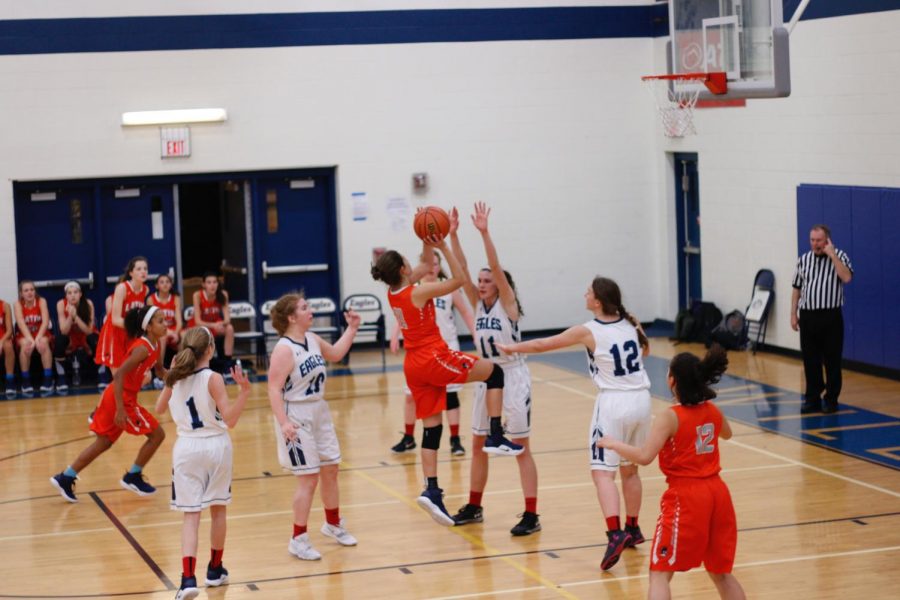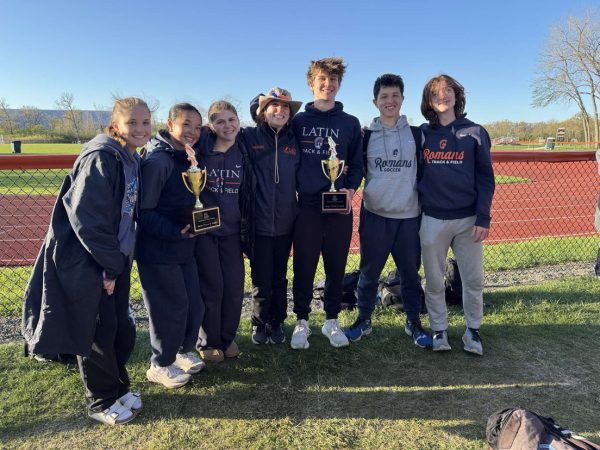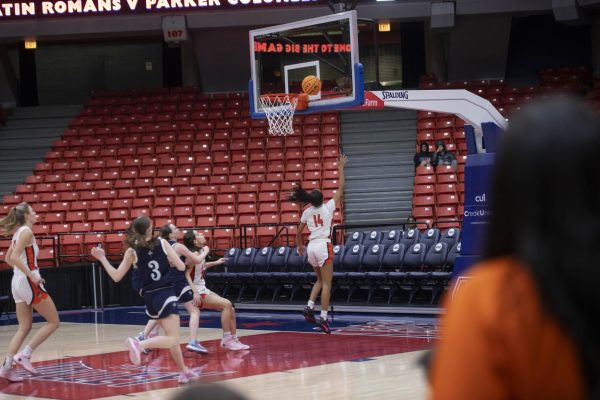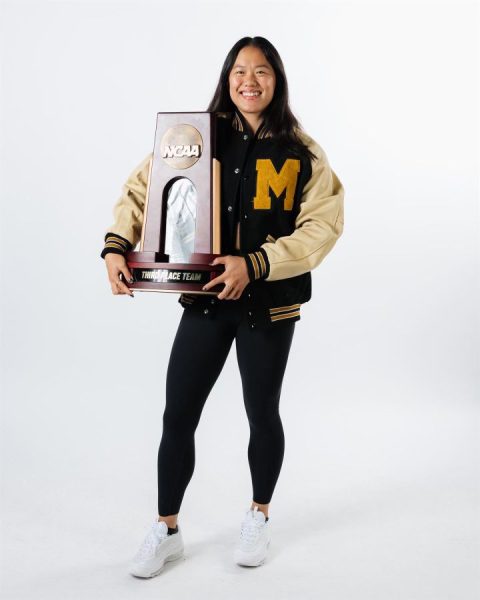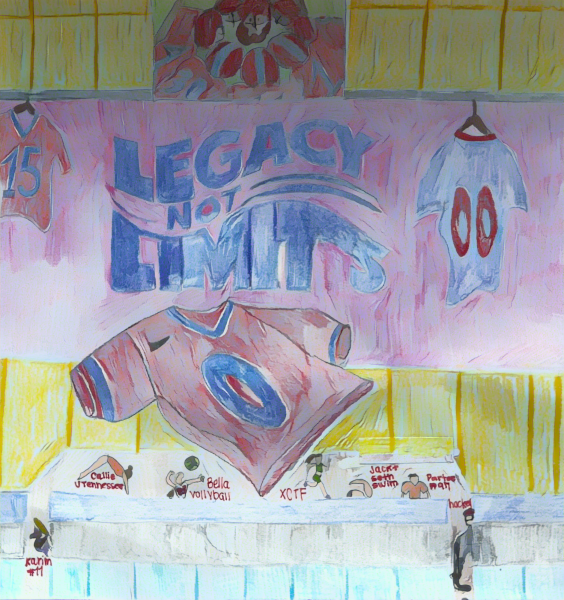IHSA and Pritzker Clash Over Basketball, Latin Left With Difficult Decision
Girls basketball player Marianne Mihas, a senior, takes a mid-range shot against Willows Academy
The Illinois High School Association (IHSA) recently voted to start the basketball season this winter, going against the directive of Governor J. B. Pritzker and the Illinois Department of Public Health to postpone the sport until spring. While the IHSA asserts that the governor does not have the right to mandate postponements and that basketball is not a high-risk sport for COVID-19, Gov. Pritzker and his staff are warning schools that defying their guidelines could result in legal consequences.
This rare rift between the two parties has left Illinois schools with the difficult question of whether to begin their basketball season on November 16, and the uncertainty has upset students as well. Latin recently decided to postpone the season and is currently making plans to provide athletes with indoor, non-contact basketball practices throughout the winter.
Coaches were expecting the season to undergo significant changes, including a reduction in the number of games and a requirement to wear masks, but the postponement was still an unexpected and relatively last-minute change. “I was surprised as it would have a major impact on schools like Latin,” said Director of Athletics Sonny Lim. “I was hoping to hear more guidance and details about this decision. Unfortunately, this has not happened and puts all of us in a very difficult situation.”
The confusion only worsened after the IHSA released its statement defying the state’s guidelines. Shahab Kousheshi, a senior on the boys varsity basketball team, echoed Coach Lim’s sentiments, saying, “The IHSA and Governor Pritzker keep giving us different information, and it’s hard to know what is going to happen moving forward.”
The IHSA’s insistence that the decision to resume sports should be in the hands of individual schools has many wondering if the governor even has the right to postpone the season. Some question whether extending its purview to sports is a productive use of the state’s time. “I believe that the IHSA is better equipped to make this decision than the governor, and they should have the final say on what happens with the season,” said Shahab. “The state government is spread very thin right now with everything going on, and I believe that the risk of playing high school sports is not as high as the governor believes it to be.”
Nevertheless, many Latin student-athletes and coaches agree that the governor is allowed to make decisions like these to protect public health. Natalie Mann, a senior captain of the girls varsity basketball team, said, “As much as I don’t like the idea of not being able to play in games, I do think he has the right to do so. I know sports are huge parts of many people’s lives, mine included, but at the end of the day, health and safety has to come first.”
With the decision to continue with a winter basketball season in the school’s hands, the athletic department spent several weeks deliberating among themselves and the administration before ultimately deciding to postpone. According to Max Rouse, the girls varsity basketball coach, the department considered several factors including the potential for scheduling conflicts among spring sports. “Kids will have to choose between sports that they normally would have been able to play over the course of a year,” Coach Rouse said. “Teams may struggle with numbers, and the athletic department is going to have to juggle schedules and facilities in unforeseen ways.”
Postponement also poses problems for athletes hoping to catch the attention of college recruiters. “This will definitely have an impact on college sports recruitment as there will be fewer opportunities for our athletes to shine and prove their worth,” said Coach Lim.
However, choosing to run certain sports this winter would have carried risks as well—risks that, for the school, outweighed the potential benefits. Already, all CPS schools have opted out of the winter basketball season, drastically reducing the number of teams in Latin’s division, while many Catholic schools such as St. Ignatius plan to have some sort of a season. Some athletes worried that a smaller league could mean a less competitive season. “I’ve been kind of going back and forth on this question over the past couple of days, but I’m glad they postponed it, because playing at the same time as CPS schools would give us much better competition and I think the chances of maybe having regionals or sectionals would go up, even if we can’t have the normal state tournament,” said Natalie.
Moreover, in response to a question about the IHSA’s statement, Gov. Pritzker implied that schools that move forward with a winter season could face legal consequences. “Schools—I think as I’ve said several times—will potentially be subject to some legal liability if something happens as a result of their playing a sport that we’ve issued guidance about that is not congruous with what the school is operating under,” he said during the press conference.
Before making their decision, the administration was hopeful that the situation would never come to this. “We were hoping that the IHSA and governor’s office would come together in the coming week so that schools like ours do not need to be put in this position,” noted Coach Lim. His hopes, however, did not come to fruition, and state leaders are continuing to decline requests for a dialogue with the IHSA.
Another less frequently discussed factor was also at play: mental health. For some, like senior and girls varsity basketball player Charlotte O’Toole, the basketball season has been an eagerly awaited way to pass time this winter. “Going into a long winter with nothing to look forward to will cause so many students’ mental health to deteriorate,” she said. “I think it’s imperative that we students know that the basketball season is still there and have something to look forward to.”
The athletic department also kept students’ mental health in mind during decision-making, and student well-being was apparently the primary motivation behind continuing winter practices. In his email to members of the girls and boys basketball teams announcing the postponement, Coach Lim wrote, “We understand that [socially-distanced basketball practices] may not be the ideal setting for many of you. However, we hope that these practices will not only allow our student-athletes to build upon their basketball skills, develop new ones, get fit and stronger, stay connected with your teammates, but also help prepare for the eventual competitive season.”
The future of the basketball season is still uncertain, with the athletic department planning to “re-evaluate the situation and make adjustments as needed” in January 2021. Still, student-athletes say they are glad that the school is still creating opportunities for them to enjoy the sport this winter. “As long as I am able to play basketball at least two days a week, I’ll be happy,” said Charlotte.
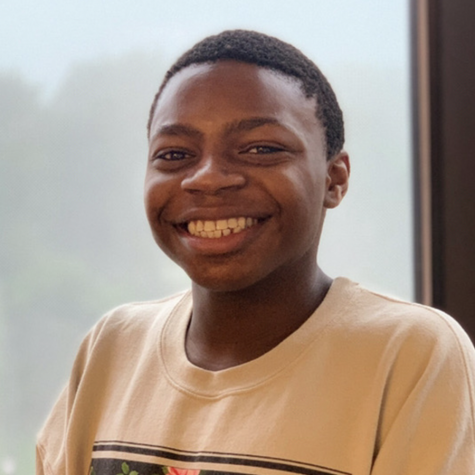
Robert Igbokwe (‘21) is a senior at Latin and is overjoyed about serving his second year as an Editor-in-Chief for The Forum. He joined The Forum freshman...


















































